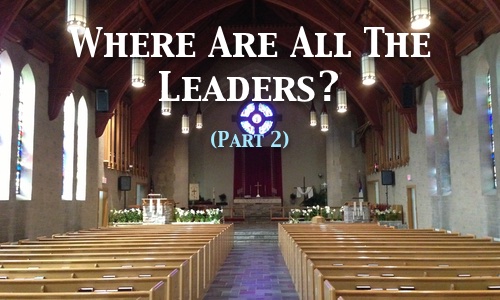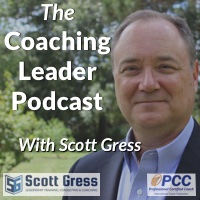
Where are you looking?
Church leaders (and other leaders) lament that they don’t have enough leaders and that they are getting tired. Sure they are getting tired. It takes a lot for someone to volunteer their time in the church. Evenings, Saturdays, Sundays fill up the calendar when one would normally be getting their shopping, laundry, house cleaning, and errands completed. Plus most people just need some down time. Church volunteers can put in a lot of time.
Then every now and then, hard working volunteers look around and wonder “who can we get to help?” It is usually at that point that they begin to think that they need to do some recruiting. So they look up from the work they have been doing and start scanning their surroundings. If the organization is the church, that usually means looking to see who is attending worship services.
But looking for “helpers” in church is often a frustrating strategy. Even on this side of the pandemic we see the crowd is much thinner than before. We also notice that some of the people there didn’t help before. Then sometimes we conclude, nope, no one here will help.
So we turn to the membership directory. Who’s in here who might “help”? We get to the end and all we’ve seen are
- People we gave up on before
- People we don't know at all even if they are associated with the church, and
- People who did something in the past but kind of “washed out” for one reason or another.
So we come to the same conclusion we had on Sunday when we looked over who was in church: nope, no one here will help. Finally we decide we need to pray. Good idea, we probably should have started there in the first place. But after we put in a few words to God we wonder where we will go from there.
It can be frustrating. We can start to feel sorry for ourself, feel resentful or even prideful that we are the rare servants who do everything.
In our previous blog we spoke about our assumptions. Now in the case of where to look, it requires the same self examination. What are we assuming with regard to recruiting?
- We often make a mistake when we assume that people can simply fill the spot and “help” when asked. Rarely if ever will a new volunteer servant go from nothing to significant service overnight.
- First, helpers are not leaders. Helpers are people who can do something in a one off capacity, that is, in a one time role. Leaders on the other hand take responsibility and are more deeply invested in the work and the outcome.
- Secondly, the process of becoming a leader is a growth process. That happens over time and usually through a relationship with another who invests in them.
- We often make a mistake when we assume those who did something in the past but washed out are not willing or capable. Writing people off without knowing their story can be a missed opportunity.
- First those who did not work out previously may have been in a different life or faith situation at the time.
- Secondly, those who quit serving may have run into a negative person who did not value their contribution or were not willing to share the work. Hopefully that wasn't you.
- Thirdly, they may have been frustrated with the expectations and lack of support from that other person in their life, whether spouse or other key volunteer leader. Again, hopefully that wasn't you.
- We often make a mistake when we assume how people will answer us when they are asked.
- How come we often hear ourselves say “They are too busy” and don’t call them?
- How come we often hear ourselves say, “They don’t attend much” and we don’t call them?
- The truth is that we disrespect people by deciding for them but we show respect by carefully and deliberately talking with them and asking them where they are and what they may want to do.
- We often make the mistake when we assume that since someone seldom attends or is not a member, that they are not candidates for serving.
- The truth is that worship is not the only doorway to serving. Nor is it the only doorway to faith. The reality is that wherever they are, non-member spouse, infrequent visitor, non-member parochial school parent, many can be led through the “doorway” to not only leadership but also to greater faith in Christ through serving. As they serve, they interact, observe and learn about the people of God and the Savior when they are involved. It is often a wonderful starting place that we can notice and encourage and celebrate.
So where are all the leaders? Well, where are you looking? There are so many more surrounding you than you may initially realize. Plus the starting line for those relationships is probably much earlier than you imagine as well. That may be more time with them, but we will be richer for the investment we make in such people.
Rev. Scott Gress is believes in Growing People for Ministry by focussing on leadership, discipleship and teamwork. Contact Scott if you are interested in him working with you or your church. A free 30 minutes sample session is available to explore how you might work best together. The Coaching Leader Podcast is also available on iTunes and his YouTube page. You can contact Scott through email scottgress@me.com or his blog page scottgress.com or at 561-542-4472
"Growing People for Ministry" Leadership + Discipleship + Teamwork
Check out the: Coaching Leader Podcast!

